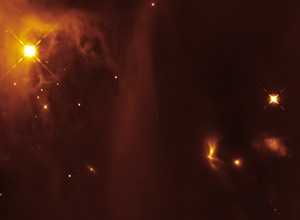IC 348
| IC 348 | |
|---|---|
|
Hubble image of IC 348 and its surroundings.[1] | |
| Observation data | |
| Constellation | Perseus |
| Right ascension | 03h 44m 34s[2] |
| Declination | +32° 09.8′[2] |
| Distance | 1,028 ly (315 pc)[3] |
| Apparent magnitude (V) | 7.3[2] |
| Physical characteristics | |
| Estimated age | 2 million years |
| Other designations | C 0341+321, Collinder 41 |
IC 348 is a star forming region in the constellation Perseus located about 315 parsecs from the Sun. It consists of nebulosity and an associated 2 million year old cluster of roughly 400 stars within an angular diameter of 20″. The most massive stars in the cluster are the binary star system BD+31°643, which has a combined spectral class of B5.[3] Based upon infrared observations using the Spitzer Space Telescope, about half of the stars in the cluster have a circumstellar disk, of which 60% are thick or primordial disks.[4] The age of this cluster has allowed three low mass brown dwarfs to be discovered. These objects lose heat as they age, so they are more readily discovered while they are still young.[5]
References
- ↑ "Hubble captures strobe flashes from a young star". ESA/Hubble Press Release. Retrieved 8 February 2013.
- ↑ 2.0 2.1 2.2 "IC 348 -- Open (galactic) Cluster". SIMBAD. Centre de Données astronomiques de Strasbourg. Retrieved 2011-04-04.
- ↑ 3.0 3.1 Luhman, K. L. et al. (August 2003). "A Census of the Young Cluster IC 348". The Astrophysical Journal 593 (2): 1093–1115. arXiv:astro-ph/0304409. Bibcode:2003ApJ...593.1093L. doi:10.1086/376594.
- ↑ Lada, Charles J. et al. (March 2006). "Spitzer Observations of IC 348: The Disk Population at 2-3 Million Years". The Astronomical Journal 131 (3): 1574–1607. arXiv:astro-ph/0511638. Bibcode:2006AJ....131.1574L. doi:10.1086/499808.
- ↑ "Astronomers Discover Youngest And Lowest Mass Dwarfs In Solar Neighborhood". Science Daily. April 24, 2009. Retrieved 2011-04-04.
